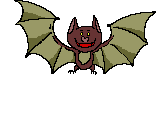Most bats are harmless, but a few carry rabies, a deadly disease which bats can pass on to humans through small bites and scratches. Five rabid bats have been found in Washington so far this year, and two of them came from Snohomish County.
Bats like to “hang out” in vacation cabins, attics, barns and outbuildings, and wherever there are plenty of insects they can eat. Anyone who might have been bitten, scratched or simply sleeping in a room where a bat is later found should contact the Snohomish Health District’s Communicable Disease team at 425.339.5278.
RESOURCE: Safely capturing bats for rabies testing (PDF)
Rabies is a severe viral disease that affects the central nervous system. It is almost always deadly once the virus attacks your body, but you can receive preventive treatment if you’ve been bitten or scratched by a bat or other potentially rabid animal. Symptoms normally occur two to eight weeks after exposure, but the incubation period may vary.
What are the symptoms?
While early symptoms include headache, fever, and sometimes pain at the site of the exposure (bite), the disease rapidly progresses into a severe nervous system (neurologic) illness. Symptoms may include agitation, confusion, paralysis, and difficulty swallowing. Most patients die within a few days or weeks of onset.
What should I do if I find a bat in my living space?
- Never handle a bat with bare hands.
- Only capture bats that have had direct contact with a person or pet, or if the bat was found in the room of someone who may have had contact with the bat (i.e., someone was sleeping in the room or building where the bat was seen).
- If you think direct contact between a bat and a person or pet may have occurred, do not release the live bat or throw out a dead bat, unless your local health department has told you that it will not be necessary to test the bat.
What should I do if an animal bites me?
- Clean the site of any animal bite with soap and water.
- Contact your health care provider and the Snohomish Health District to determine the potential for rabies exposure, need for treatment, and to decide whether or not to test the animal for rabies.
What can I do reduce the risk of rabies exposure for my family and me?
- Do not handle wild animals, especially bats.
- Teach your children never to touch or handle bats, even dead ones. Have your children tell an adult if they find a bat at home, at school, or with a pet.
- Keep bats out of your living space by bat-proofing your home.
- Pets can get rabies if bitten by a rabid animal. Protect them and yourself by getting them vaccinated routinely. Dogs, cats, and ferrets are now required to be vaccinated in Washington. Consult your veterinarian for vaccine recommendations.
- People often call a pest control company to get rid of bats in or near their home. Those companies should also refer people to the Health District to make sure the client was not exposed to rabies.
The Snohomish Health District works for a safer and healthier community through disease prevention, health promotion, and protection from environmental threats. To read more about the District and for important health information, visit www.snohd.org.





June 9, 2017
Everett